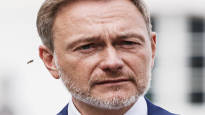During the crisis years, Germany distributed the most aid money in Europe. Now it’s going to save.
BERLIN The most important thing in the European economy now is inflation and the fight against it, the German finance minister Christian Lindner said while meeting foreign journalists on Thursday in Berlin.
The ECB has been trying to curb inflation for over a year by raising the price of money, i.e. interest rates. It will decide on possible new interest rate hikes next Thursday.
Partly with inflation, Lindner also explains why Germany’s new budget plan for next year is significantly stricter than previous ones. The ruling party, the Greens, would like large electricity price subsidies for German companies, but in Lindner’s opinion, that would make it difficult to fight inflation and cause more damage.
– In this situation, it would be wrong to continue the stimulating monetary policy. That would only lead to an acceleration of inflation, says Lindner.
In Lindner’s opinion, other euro countries should also stop supporting the economy with public funds.
For example, in Finland, the budget deficit will deepen in the coming years, while in Germany, the strict financial management that preceded the corona pandemic will return. Finland’s budget for next year will also be larger than before, while Germany’s budget will decrease.
– Economic growth cannot be bought. Money can only be distributed as much as the economy produces. The private sector is what guarantees prosperity, Lindner explains the policy of the German government.
“Debt brake” on again
As the guardian of the state’s treasury, Lindner wants Germany to return to complying with the debt brake enshrined in the constitution. The brake limits indebtedness and budget deficits.
The principle was put on the shelf for the years 2020–2022 to deal with the energy crisis caused by the corona pandemic and Russia’s war of aggression.
Germany will take on 30 billion euros less debt this year than last year. All ministries have to save.
On the other hand, the German federal government has a number of criminal funds outside the budget that are heavily indebted.
“There is an iceberg ahead”
According to Lindner, the state’s fiscal policy must be changed due to the rise in interest rates. Germany will pay 37 billion euros in interest on its debts next year, which is ten times more than in 2021.
– We simply cannot afford to incur unlimited debt, because it would be impossible to finance loan reductions.
Lindner warns that budget negotiations will become even more difficult in 2028 and beyond. At that time, Germany has to start paying off the debts incurred during the pandemic and joint loans taken out for the EU’s recovery fund.
– There is an iceberg ahead, Lindner said when presenting the budget to the German Bundestag.
Added to the text on 8.9. at 10:04 information on the debt of the German government’s special funds.
